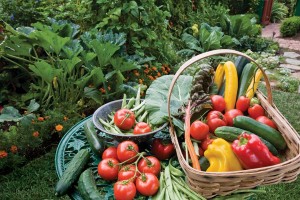These days creating an organic vegetable garden has become a very popular goal and pastime. There’s no knowing what chemicals are sprayed on our food before they are sent to the supermarket for our consumption, but those who grow their own are very clear about what is or isn’t on their veg.
Thank you for reading this post, don't forget to subscribe!

Fortunately the practices that are used in organic gardening are best practices for gardening in general. What makes organic gardeners different is that they don’t use any fertilisers or pesticides that are synthetic on their gardens. They see their garden as being part of an eco-system along with wildlife, insects, water, soil and nutritious food for people. Growing an organic garden is about working in harmony with nature.
Here are the first 5 steps in creating your own organic garden:
Design
The ideal vegetable patch needs sunlight for most of the day, good drainage and preferably will be located away from large trees that are likely to suck the nutrients of your crops away. Design your bed so that you don’t have to walk all over it in order to reach the centre. Remove any weeds with a focus on removing the roots too. Some gardeners opt to cover the bed with a black polythene tarpaulin sheet for a few months. Dig compost or mulch into the soil to prepare it to feed your crops.
Make compost
Every household has some vegetable waste to add to a compost heap. The best thing about compost is that its food for your plants and it’s free. It’s a good idea to set up a compost heap that is located close to your vegetable garden. You can add any vegetable waste from the kitchen in addition to your grass cuttings. Over time they will gradually decompose to become a nutrient rich addition for your soil.
Less is more
We recommend that you start with a small selection of plants. Each one will have its own unique characteristics and some are easier to grow than others. Those without a lot of space may even create their organic vegetable garden in pots and window boxes.
Choose organic
Select organic seeds to get started. It’s also a way to support organic seed growers who we want to stay around for the long term.
Protect plants the organic way
Using organic protection methods will save you from needing to apply chemicals to your plants. You can use plants to repel pests and nets to keep birds off your crops. There are natural products that can prevent slugs from eating all your plants such as copper rings or even wool pellets.
Have you got an organic vegetable garden? If so, what are your tips to keep it growing well?
